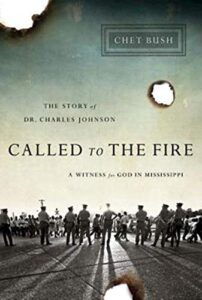 Summary: A brief biography of Charles Johnson, a pastor in Meridian, Mississippi, and one of the witnesses in the Mississippi Burning Trial.
Summary: A brief biography of Charles Johnson, a pastor in Meridian, Mississippi, and one of the witnesses in the Mississippi Burning Trial.
I picked this up because it was free in the Audible Plus catalog. I am satisfied with the time I spent on the book because I was not aware of the story of Charles Johnson previously. But once I was about an hour into the book, I looked around for reviews to decide if I wanted to finish the book. This review discussed how this biography was framed as an old-fashioned missionary biography, giving me the language to accept the style. (I encourage you to read that link if you haven’t.)
The book opens with Charles Johnson as a young child. A white salesman worked in his Black community of Orlando. In his spare time, that salesman encouraged youth, occasionally hired them, and eventually opened a community center. Through his work, Charles Johnson became a Christian. When Johnson felt the call to ministry, that salesman helped him attend a Nazarene seminary in West Virginia. As the review notes, the Nazarenes were segregated, including their seminaries. So the only seminary Johnson could have gone to within the Nazarene movement was the one in West Virginia. Bush notes denominational racism several times in the book. Still, the book’s framing, even as it attempts to show how Johnson moved beyond the holiness pietism of the Nazarenes more generally, has that pietism in the background. He shows that Johnson kept to Nazarene pietism through the emphasis on evangelism toward the end of his life and in his rejection of acceptance of the invitation to the Carter inaugural ball because it served alcohol.
I have read many missionary biographies, and many of the genre’s tropes are here. They tend to be short; this was less than four hours in audiobook. They emphasize supernatural calling and intervention. They focus on the action, not the interior life or mundane everyday work. And they always talk about what was given up to serve God, including losing family or spouse. And the story of one of the KKK members who was convicted for the killings became Christian in jail and personally came to ask for forgiveness from Charles Johnson after leaving jail fits the genre’s tropes as well. I think of these types of books as hagiography. I can see how Chet Bush is attempting to subvert some of the genre by making Johnson the subject (he is Black in a predominately white denomination, and the story’s location is the US, not the international mission field).
The problem with the genre is that it makes the Christian life into a hero story. This is a distortion of what it means to be a Christian. There is the additional problem of the limited view of the gospel, even though there was an attempt to subvert that in this book by emphasizing the work of addressing racism and poverty and the refrain of Charles Johnson about the gospel being for the “whole person.” But that refrain is not enough to counter the individualism and pietism that runs throughout the book.
Again, I do not think this is a bad book, and the review I linked above talks about how this was written when Chet Bush was a pastor in Mississippi and how he later went back to get his Ph.D. in history. I would pick up newly written books, even if Called to the Fire has weaknesses. I have not previously read anything written mainly about the Mississippi Burning case, so I wonder whether this book adds to other books about that story by emphasizing Charles Johnson. I categorize this as a book I am glad I have read, but I am hesitant to recommend it if you read it for biography or civil rights history. Many other books are better, especially if you are not well-read in either area.
Called to the Fire: A Witness for God in Mississippi-The Story of Dr. Charles Johnson by Chet Bush Purchase Links: Hardcover, Kindle Edition, Audible.com Audiobook